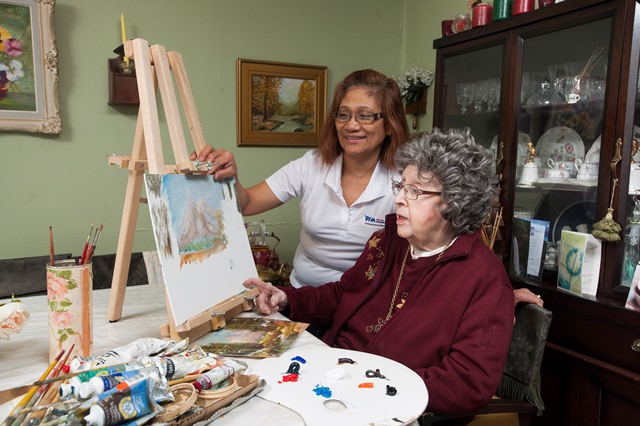Leo Diagnault has plenty of stories to tell. As a younger man, the World War II veteran worked all across the country—on the CN rail lines, as a security guard at Rideau Hall, and as an airline mechanic. Today, Leo spends most of his time at home, in an apartment he shares with his wife and caregiver, Esther. “My husband is very friendly,” says Esther. “He can remember lots of things about those experiences. He loves to share his stories when he can remember.”
Leo started showing signs of dementia five years ago and Esther soon became his full-time caregiver. It’s a role she performs lovingly, but it can be exhausting. “I take care of him every day, 24 hours a day. He uses a walker around the house and sometimes he’s off balance, so I keep an eye on him. If he gets up in the night, I get up with him.”
Esther knew she could use extra support so she could take a break, but she wanted to feel good about the type of care Leo received from an outside caregiver. Through Veterans Affairs, the couple learned about VHA Home HealthCare’s free Activation Program. In this one-year pilot program, VHA’s trained Personal Support Workers or volunteers do stimulating activities with the client while their caregiver has time to his or herself. Clients receive a three-hour visit twice a week for three months.
In a focus group survey, caregivers indicated that they wanted more activity for their loved one. For Esther, this meant someone who would listen to and chat with her conversational husband. Her VHA volunteer worker “is very creative. Sometimes I don’t go out right away and I see he starts working with Leo immediately, using puzzles and games to make his brain work. He does it in a way that my husband can follow along,” she explains.
That is exactly how this free program is designed to work. “We do an in-home assessment to get to know the client, their past, their interests and limitations,” says Elise. “Then we create a customized care plan for them. A lot of clients have cognitive, memory and dementia issues, so we do games with them, get them chatting and looking at pictures, as well as physical activity such as bedside deep breathing, seated exercises, and just getting out and taking walks. It’s very specific to the client.”
With the free time she has gained, Esther can get groceries, make appointments or simply go to the mall. “It is very helpful for me—just to be outside and relax—and I don’t feel worried about my husband.” The sessions also help Leo. “He really enjoys when the worker comes, and he remembers a lot during their sessions. He cannot remember when he is gone, but while he is there he enjoys it very much, and he recognizes him when he sees him again.”
The pilot program will wrap up at the end of the year, but VHA Home HealthCare is hoping more funding will be available to make full implementation possible so more clients can benefit from activation and their caregivers can have peace of mind.
Activation Tips:
- Try various activities including verbal, visual and hands-on activities. Be aware of your loved one’s limitations.
- Read together or do simple puzzles.
- Play music the person is familiar with to tap into deep memories
- Do arts and crafts such as flower arranging, painting with water colours or modelling with clay.
- Try gentle physical activity like seated stretches or short walks.
- Always reassure your loved one that they are doing a good job.


